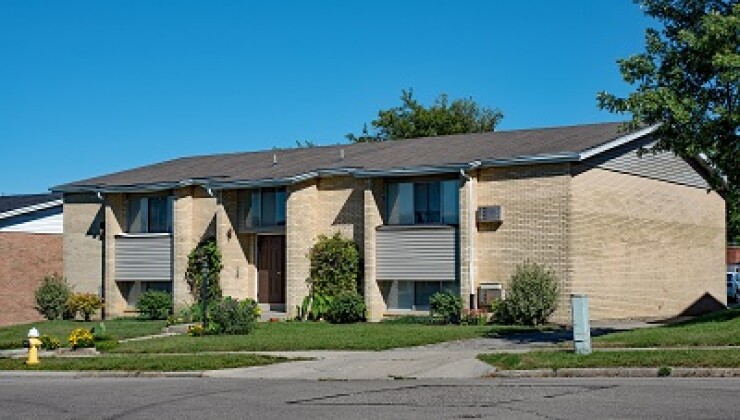Owners of transitional commercial real estate properties continue to find takers of short-term bond offerings through CRE collateralized loan obligations.
But those sponsors are primarily restricting assets to the lower risk multifamily and office buildings that lenders are more confident will weather the economic strains brought by the COVID-19 pandemic.
Boston-based Berkshire Residential Investments, for example, is in the market with its third CRE CLO deal in a new $820.9 million bond offering backed by a portfolio of dozens of lower-grade apartment complexes in various stages of renovation and renewal.
MF1 2020-FL3, like two others that have priced since the coronavirus outbreak took hold in the U.S. in mid-March, is focused on the multifamily/office/industrial sectors, and conspicuously excludes more volatile assets such as hotel and retail properties.
Both Moody’s Investors Service and DBRS Morningstar have assigned preliminary triple-A ratings to the $445.87 million Class A tranche, which is subordinated by six mezzanine note classes.

The MF1 deal, which has two-year noncall, will have a pool of 26 obligors with first-lien mortgages on various portfolios of multifamily properties, all of which are assessed at below investment-grade type, according to Moody’s. But many of the properties are generating revenue from tenant occupancy despite ongoing upgrade projects, according to Moody’s.
For example, the largest loan held in the transaction is for a trio of apartment complexes in New Jersey and Pennsylvania built between 1997 and 2007 that are currently 85.6% leased across 822 units. The portfolio sponsors have begun a $12.5 million renovation program for units and common areas of the properties that were recently recapitalized through a $100 million loan underwritten by a Berkshire subsidiary.
Likewise, the Fairland Crossing garden-style apartment property in Silver Spring, Md., is 91% occupied while the owners implement a $9.5 million renovation program for the units in its 38 buildings that were first developed in 1974.
The MF1 deal is being launched as the CRE CLO market continues to show improvement, according to a new report issued by CRE database firm Trepp. CRE CLO deals were a $22.4 billion subset of the commercial mortgage backed securities market in 2019 - a volume level that exceeded 2018's breakout year of $17.7 billion (a 26% increase). The market priced $3.4 billion in new deals this year prior to nationwide quarantining and non-essential business closings that put a halt to structured finance and other securitization market activity.
“[M]arket sentiment has steadily improved and issuers once again resumed marketing activity for pre-COVID offerings,” Trepp’s newly issued report stated. “Capital is still plentiful and investors are still actively looking for yield as evidenced by the reception of the recently priced deals. This could help the market recover quicker than it did after the recent financial crisis.”
But the market projects to be well off 2019's pace. Even with the recently priced deals totaling $1 billion - and Berkshire's latest offering - Trepp is projecting a 40% decline in volume for 2020.
One constraint is the likelihood that hotel and retail properties won't return to CRE CLO assets any time soon. Each sector has been hard hit by the economic strains that the coronavirus outbreak has brought to travel and shopping mall traffic. “It is hard to imagine lenders providing capital for transitional hotel or retail properties in meaningful numbers anytime soon,” Trepp’s report stated.





